Tableau Ambassador | Data Viz Junkie. Blogger. Biker. Dad. Drummer. and Co-Lead of the Cleveland TUG.
Twitter: @MarkBradbourne
Website: http://sonsofhierarchies.com
Mark Bradbourne has been working in the “data” space for over 20 years now and spent the first 15 years of his career in full-lifecycle end-to-end Business Intelligence and Data Warehouse development. Mark obtained his certified Business Intelligence Professional certification focused in Business Analytics from The Data Warehouse Institute (TDWI) in 2011, however, over the past 6-7 years, Mark has focused on the end users of these products, and thus, on data visualization. Mark co-leads the Cleveland Tableau User Group and is honoured to be counted among the list of Tableau Ambassadors.
I was happy to be able to have a conversation with Mark.
Toan: Tell us a little about your background, how did you get into Data, Business Intelligence and Data Visualization? and how did you find your way to Tableau?
Mark: I started my data journey back in 1997 when dinosaurs roamed the earth. I was a programmer/analyst for an electronics supplier and producer and worked on a new “Data Warehouse”; I was fresh out of college, so I had no idea what I was stepping into at the time; I knew some SQL and understood databases, but that was it. From there, I worked on all the aspects of Data Warehousing, Business Intelligence and Data Analytics for a variety of companies. Everything from requirements through to end-user training.
Fast forward 10 years, I was really focusing in on user-focused work, and especially data visualization and data presentation to end users. At the time I was using BusinessObjects Desktop Intelligence (now known as SAP Reporting).
Fast forward 5 years to 2012, and I was working for a Real Estate Investment Trust (REIT) who had just purchased SAP BusinessObjects (SAP acquired Business Objects in October 2007 for $6.78 billion). I had been a heavy SAP BusinessObjects user for 10 years, so I was fully onboard until I took a deeper look into their dashboarding tool, Xcelcius, and it was not going to work for what we wanted to do.
Therefore, I started looking at Gartner’s Magic Quadrant for potential dashboarding tools and decided to do a bake-off between Qlik and Tableau. I downloaded Tableau first, and from the moment of download to first dashboard, it was about 30 minutes. I never downloaded Qlik; Tableau won.
Toan: I started with SAP BusinessObjects as well, many moons ago, what were the key limitations of Business Objects Dashboarding Tool, Xcelcius? What were the key factors driving your search? And what was it about Tableau that put it so far ahead you did not download Qlik?
Mark: The key limitation for me was the cumbersome mapping that had to be done using Excel. There was no live connection to any database from the tool, and you were forced to use Excel as a conduit; so I knew there had to be something better. At the time, we had data sitting in Microsoft Excel, SAP BW and Microsoft SQL Server and I wanted a tool that could touch all three data sources directly. The thing that really sold me on Tableau was the intuitiveness of the UI. I had used BI tools in the past, so I am sure I had a bit of an edge, but I would guess that I “knew” where 75% of the features and functions were from the first time I looked at the UI.
In 2015, I went to my first Tableau Conference and at the end of 2016 I got serious and decided to change my career trajectory and focus primarily on Tableau.
Toan: Tableau conferences are a crazy fun place, but was there a specific moment that sold you on Tableau? A moment of clarity, someone you spoke to or something you saw?
Mark: I do not know if it was a specific moment, but it was more the overall vibe. I felt like I found my tribe. I had been to user group meetings and special interest groups in the past, but I did not ever meet anyone who was like me.
Toan: Funny question, how did you become the 1st person to book TC19? There must be a good story there, right?
Mark: It actually started a month before I went to TC18. I was in a meeting with my boss and we were talking about the conference, and what my plans were once I returned, as far as debriefing and sharing what I learned. At the end of the conversation, I told him that I would be buying my conference ticket before I left conference because I felt that it was THAT important of a learning and networking opportunity, that if work did not send me, I would be going anyway. I think he was a little taken back by my statement, but I explained to him that if I was paying my own way, I would be going as cheap as possible, and on the chance that work sends me, work would pick up the savings, so it was a win-win. So fast forward to the end of TC18, after they announced the location of TC19 and Elissa said tickets are now available, I got on my phone, went to the site and bought my ticket while I was on my way to the next session.
It made me laugh that I was first and that Tableau tweeted about it, but I guess I am the Alpha Nerd.
Toan: Personally speaking, what has been the most rewarding work (or project) you have done using Tableau?
Mark: From a work perspective, I launched a Tableau Doctor practice to help support the organization’s culture of analytics and drive the internal skills to a high level. While this is not a development project, it has been very rewarding.
Outside of work, although as not active as I would like to be currently, I love the work that #VizForSocialGood and #DataForaCause do, and I do love contributing to those projects. For a long time, I struggled with “how to give back” using my skills, and those two projects are a blessing.
Toan: You recently set up the mentoring meet up (http://www.mentoringmeetup.com), tell us about your thought process behind this initiative, and where you see this going?
Mark: The Mentoring Meetup was born out of a couple of inspirational points. The first one, was my wanting to make everyone as passionate about Tableau as I am, and I think the biggest way that can happen is by encouraging other’s learning. I had been toying around with the idea of setting up a Mentoring Network at work, but I did not want to be responsible for the matchmaking. At TC18, I was attending Mike and Alicia’s presentation on their mentorship together and it kind of clicked for me, except, I decided to take it one step further and launch it into the wider community.
I am not sure where it is going yet, but I know that many of those who volunteered to be mentors did engage with mentees, so I see that as a positive. The aspect of hosting the virtual meetups, it has not taken off the way I wanted it to yet, but I hold out hope.
Toan: To add to the above, what was the most challenging project you have experienced in Tableau, and why? How did you overcome this challenge, and what advice would you give to people who experience the same challenge? What would you say to yourself if you had a time machine?
Mark: Some of the most challenging projects professionally have usually been centred around a user who does not know what they want, and worse how to articulate it due to a lack of data literacy. Basically, they have been told they need a dashboard, but cannot move past their monolithic spreadsheet. In those moments, patience is a virtue, and it’s our job to educate, inform and then we can provide them with the information they need. It is easy to go off and develop a dashboard you THINK the business requires, but if it does not answer their questions, or worse yet, they do not know how to read it then you have lost.
As data literate people, we need to lead the charge, spend the time, and share the knowledge we must move everyone a little closer to the goal.
Toan: Data literacy is a journey, what tools have you used to help people along on that journey? Do you have resources that you consulted regarding this?
Mark: This is an area I am still trying to find a path on professionally. Probably the tool I use the most is patience, and having the ability to put technical concepts into business terms is a real necessity. I am also following Ben Jones’ new company with great interest and hoping to use what he is developing in my path to teach data literacy, https://dataliteracy.com, which is coming soon.
Toan: Tableau is amazing, where do you see Tableau going in the next few years. What features would you love to see, or functionality improved upon? If you were the CEO of Tableau, what would you see as the key?
Mark: I think we are going to start seeing more integrations around AI and Machine Learning. Deeper integrations with R and Python as well. As the Data Scientist continues to evolve towards the data storytellers, that bridge is going to need to be built; you can only GPlot so much.
If I were the CEO, I would continue to nurture and foster the community. Tools are Tools and each platform is going to add features that the others will implement as well. First to market is good, best to market is better, but the true differentiator to me is what the greater Tableau Community brings to the organization. The value that the community adds to the platform is immeasurable.
Toan: The first community that I was a part of was the Business Objects Board (BOB), I am sure you would remember this chestnut, how is the Tableau community different? and what do you think it is about the Tableau community that makes it different and special? And what could people do to ensure the community stays special?
Mark: I loved the BOB Board back in the day! If you search for my name, I am sure you can find my posts out there, and it was a daily visit for me! I think where the Tableau community is different is the number of channels we have for communication. I think if the BusinessObjects community would have had Twitter, Reddit, Slack, and Instagram, you may have seen a very similar community grow, although there is a greater passion for the Tableau platform.
I think SAP really killed the BOBJ community, and it was a sad thing to witness
Toan: Tableau has an amazing community for learning and there are loads of places to go. What is your top tip for really excelling within Tableau, what is your secret?
Mark: My top tip; get involved. The game changer for me was getting involved on Twitter. Before that, I was on the message boards, but that was central to me, once I started following some of the community leaders, I started to learn more and through that, I got involved with #MakeoverMonday (https://www.makeovermonday.co.uk). Through that vehicle, I started to get involved in other things, started to get feedback, and learn even more than even imaginable. This does take a love of discipline, as you cannot just do it during working hours, so if you want to really excel, it takes practice and failure, and learning and success.
Toan: Working after work is a tough challenge for many people; most start like a ball of fire, and then slow down after a few weeks, just like gym memberships in January. What would you like to say to motivate people to keep going? What is your six-pack secret?
Mark: I think the trick is to start small, find something you are passionate about and make time for it. We all have time. We have time to go to the gym, we have time to eat healthily, we have time to call friends and loved ones. But we do not. We fill out time with other things, easy things, so you have to set a goal.
For example, when I learned about #MakeoverMonday in late 2016, I did it very casually if the dataset interested me and never published; I was not fully engaged. My new year’s resolution for 2017 was to do all 52 weeks of #MakeoverMonday, and publish them. I told myself it would take an hour a week, which in the grand scheme of things is not a lot of time; it is time I would otherwise be spent watching TV or staring blankly at Facebook. When I realized I did not have a problem finding the time, I started to look at other things, like #VizForSocialGood, and spent time there working on my skills.
By removing the excuses and distractions I made time for things I truly wanted to accomplish. It is honestly been a life-changing realization.
Toan: What do you do when you are not immersed in Tableau?
Mark: When I am not doing Tableau stuff, I can be found hanging out with my wife of 18 years, Rose, and my daughters Jenna (14) and Jillian (10). I ride motorcycles, play disc golf, and enjoy reading when I get the chance.
I also am a musician, a drummer, for a local original rock band in Cleveland called “Dead Letters”. I have recorded and released 5 albums with various artists over the past few years, some of which can be found on iTunes and Spotify. I have been playing the drums for 30 years and actually started my college career as a percussion major; I was going to be a band director but ended up with a degree in Computer Programming and Business/Organizational Communication.
I am a Life Member of Kappa Kappa Psi (National Honorary Band Fraternity) and am an Honorary Member of Tau Beta Sigma (KKPsi’s sister organization).
Tableau Ambassador | Data Viz Junkie. Blogger. Biker. Dad. Drummer. and Co-Lead of the Cleveland TUG.
Twitter: @MarkBradbourne
Website: http://sonsofhierarchies.com
A Conversation with Season 1:
- Episode 1 / Mark Bradbourne
- Episode 2 / Josh Tapley
- Episode 3 / Lindsay Betzendahl
- Episode 4 / David Pires
- Episode 5 / Dilyana Bossenz
- Episode 6 / Yukari Nagata
- Episode 7 / Emily Kund
- Episode 8 / Ken Flerlage
- Episode 9 / Sarah Burnett
- Episode 10 / Merlijn Buit

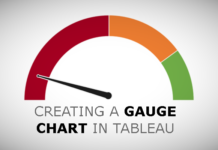
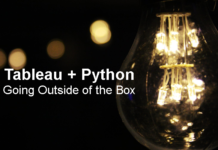

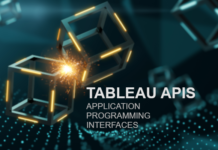
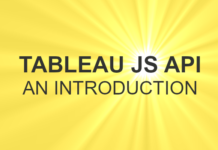
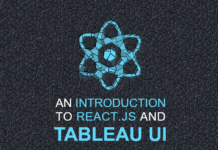

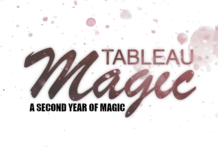
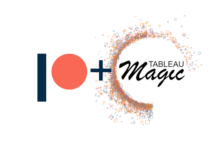
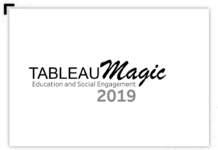

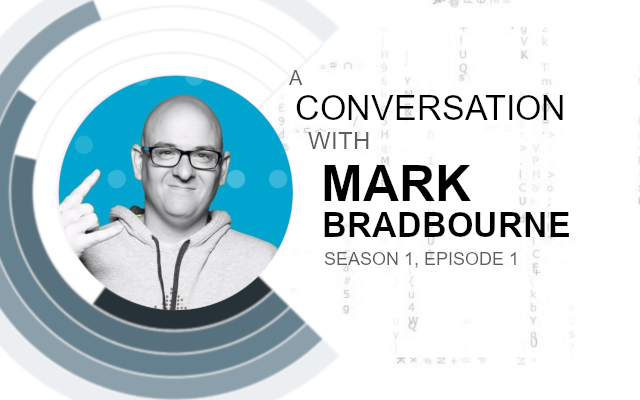
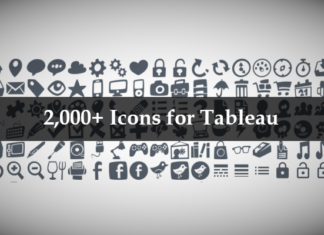




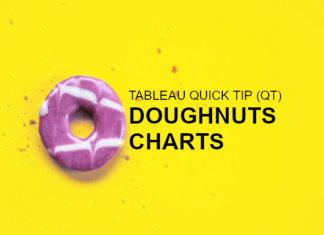




It was a nice reading